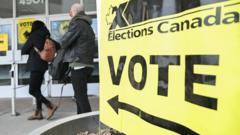In a crucial election marked by a fluctuating political landscape and a national tragedy, Canadians are set to vote on Monday, facing influences from U.S. President Donald Trump that have significantly reshaped the contest. Early predictions at the start of the year suggested a Conservative Party victory under Pierre Poilievre was all but assured, but his party's position has weakened amid concerns surrounding Trump's tariffs and aggressive comments about Canada’s sovereignty. Notably, the Liberal Party, led by incumbent Prime Minister Mark Carney, is showing signs of resurgence, with recent polls indicating a competitive race.
Canadians Head to the Polls Amid Influences from Trump and National Tragedy

Canadians Head to the Polls Amid Influences from Trump and National Tragedy
As Canadians prepare for a major election, the shadows of Trump's politics loom large over the campaign landscape.
The atmosphere surrounding the election has been further complicated by a tragic incident in Vancouver, where a car ramming attack left 11 dead during a local festival, leading both Carney and Poilievre to address the crisis in their final campaign efforts. Carney, leveraging his experience from the financial crisis and Brexit, has framed the election as a referendum on Canada's future relationship with the U.S. and has called for strengthening ties with reliable allies such as the UK and EU.
As the campaign comes to a close, candidates from different parties are making their final pushes to secure votes. While Poilievre has positioned himself as the voice of change against the backdrop of a "lost Liberal decade," smaller parties such as the NDP and Bloc Québécois struggle to gain significant traction, overshadowed by the dominant two-party race. With high voter turnout anticipated, Canada's long-standing tradition of alternating Liberal and Conservative leadership is under scrutiny as the country grapples with both national and international pressures.
Polling begins at 08:30 local time in Newfoundland and Labrador, and a significant number of voters have already cast their ballots early. As Canada heads into this pivotal election, the outcome may redefine not just domestic politics but the nation’s perception on the global stage amidst the evolving dynamics with the U.S.
As the campaign comes to a close, candidates from different parties are making their final pushes to secure votes. While Poilievre has positioned himself as the voice of change against the backdrop of a "lost Liberal decade," smaller parties such as the NDP and Bloc Québécois struggle to gain significant traction, overshadowed by the dominant two-party race. With high voter turnout anticipated, Canada's long-standing tradition of alternating Liberal and Conservative leadership is under scrutiny as the country grapples with both national and international pressures.
Polling begins at 08:30 local time in Newfoundland and Labrador, and a significant number of voters have already cast their ballots early. As Canada heads into this pivotal election, the outcome may redefine not just domestic politics but the nation’s perception on the global stage amidst the evolving dynamics with the U.S.




















